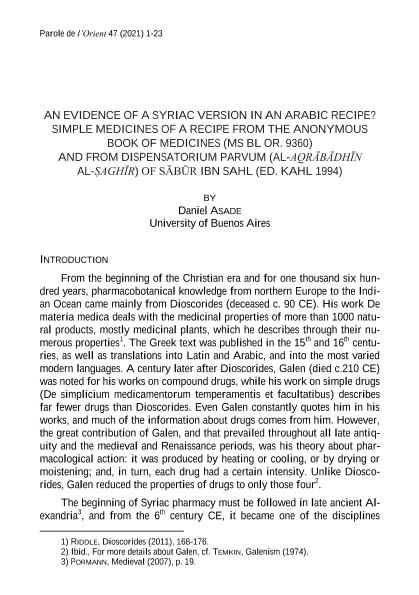Mostrar el registro sencillo del ítem
dc.contributor.author
Asade, Daniel Julio

dc.contributor.author
Druille, Paola Ivone

dc.date.available
2024-04-05T11:27:55Z
dc.date.issued
2023-12
dc.identifier.citation
Asade, Daniel Julio; Druille, Paola Ivone; An Evidence of a Syriac Version in an Arabic Recipe? Simple Medicines of a Recipe from the Anonymous Book of Medicines (MS BL OR. 9360) and from Dispensatorium Parvm; Université Saint-Esprit de Kaslik; Parole de l'Orient; 49; 12-2023; 1-23
dc.identifier.issn
0258-8331
dc.identifier.uri
http://hdl.handle.net/11336/232042
dc.description.abstract
From the beginning of the Christian era and for one thousand six hundred years, pharmacobotanical knowledge from northern Europe to the Indian Ocean came mainly from Dioscorides (deceased c. 90 CE). His work De materia medica deals with the medicinal properties of more than 1000 natural products, mostly medicinal plants, which he describes through their numerous properties1 . The Greek text was published in the 15th and 16th centuries, as well as translations into Latin and Arabic, and into the most varied modern languages. A century later after Dioscorides, Galen (died c.210 CE) was noted for his works on compound drugs, while his work on simple drugs (De simplicium medicamentorum temperamentis et facultatibus) describes far fewer drugs than Dioscorides. Even Galen constantly quotes him in his works, and much of the information about drugs comes from him. However, the great contribution of Galen, and that prevailed throughout all late antiquity and the medieval and Renaissance periods, was his theory about pharmacological action: it was produced by heating or cooling, or by drying or moistening; and, in turn, each drug had a certain intensity. Unlike Dioscorides, Galen reduced the properties of drugs to only those four2 .
dc.format
application/pdf
dc.language.iso
eng
dc.publisher
Université Saint-Esprit de Kaslik
dc.rights
info:eu-repo/semantics/openAccess
dc.rights.uri
https://creativecommons.org/licenses/by-nc-sa/2.5/ar/
dc.subject
Syriac
dc.subject
Arabic Recipe
dc.subject
Dioscorides
dc.subject
Simple medicines
dc.subject.classification
Otras Humanidades

dc.subject.classification
Otras Humanidades

dc.subject.classification
HUMANIDADES

dc.title
An Evidence of a Syriac Version in an Arabic Recipe? Simple Medicines of a Recipe from the Anonymous Book of Medicines (MS BL OR. 9360) and from Dispensatorium Parvm
dc.type
info:eu-repo/semantics/article
dc.type
info:ar-repo/semantics/artículo
dc.type
info:eu-repo/semantics/publishedVersion
dc.date.updated
2024-03-26T15:28:28Z
dc.journal.volume
49
dc.journal.pagination
1-23
dc.journal.pais
Líbano

dc.journal.ciudad
Kaslik
dc.description.fil
Fil: Asade, Daniel Julio. Universidad de Buenos Aires. Facultad de Farmacia y Bioquímica; Argentina
dc.description.fil
Fil: Druille, Paola Ivone. Consejo Nacional de Investigaciones Científicas y Técnicas; Argentina. Universidad de Buenos Aires; Argentina
dc.journal.title
Parole de l'Orient
Archivos asociados
